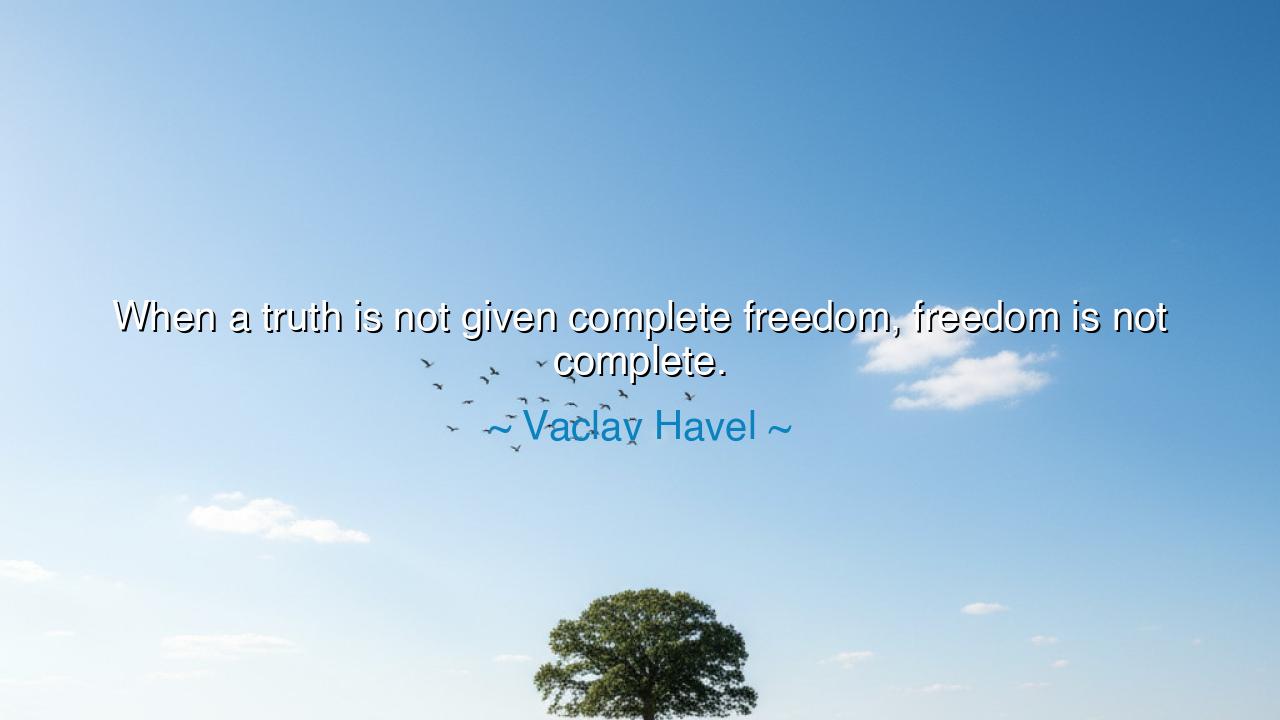
When a truth is not given complete freedom, freedom is not






Host: The room feels quiet, with the soft glow of the lamp casting a warm, reflective light across the space. Outside, the world has settled into the calm of the evening. Jeeny sits on the couch, her legs tucked beneath her, a cup of tea resting in her hands. Jack, standing by the window, gazes out at the darkened world outside, clearly deep in thought.
Jeeny: “Jack, I came across a quote from Vaclav Havel today that really made me think about truth and freedom,” she says softly. “He said, ‘When a truth is not given complete freedom, freedom is not complete.’ What do you think about that?”
Jack: He turns slowly, a thoughtful expression crossing his face. “That’s a powerful statement. Havel is saying that freedom isn’t just about the ability to do whatever we want; it’s also about the ability to express and accept truth, even when it’s uncomfortable or inconvenient. When truth is suppressed, whether by governments, institutions, or individuals, it limits freedom. If we can’t speak the truth or acknowledge it, then we’re not fully free to make our own decisions, think clearly, or live authentically.”
Jeeny: “Exactly. It’s like Havel is pointing to the idea that freedom can only exist when there is truth, and when that truth is allowed to be fully expressed and acknowledged. If truth is silenced or manipulated, then the very foundation of freedom becomes unstable. Freedom isn’t just about doing whatever we want — it’s about having the right to speak and act based on what is true, not on what is dictated or hidden.”
Host: The light in the room seems to deepen, as their conversation touches on the connection between truth and freedom. Jeeny speaks with an understanding that freedom is not merely the absence of restrictions but the presence of an open, truthful dialogue. Jack stands still, reflecting on how suppressing truth creates a barrier to real freedom.
Jack: “It’s interesting because when you think about authoritarian regimes, they often silence truth because the truth can threaten the power structure. And in doing so, they limit freedom. But when the truth is allowed to flourish — when people can speak openly and honestly — it creates a space for genuine freedom, where individuals can live based on their values, express their ideas, and shape their own futures.”
Jeeny: “Yes! And even on a more personal level, when we can’t speak our truth — whether it’s in our relationships, our work, or within ourselves — we limit our own freedom. We start living in a kind of falsehood or fear, not able to be our full selves. It’s not just about political or social freedom; it’s about the personal freedom to be honest, authentic, and transparent in every aspect of life. When we’re hiding parts of ourselves, we’re not truly free.”
Host: The conversation grows richer now, as they reflect on how truth and freedom are intertwined. Jeeny and Jack both agree that freedom isn’t just about the absence of external restrictions, but also about the ability to express truth openly and live authentically. Vaclav Havel’s words remind them that when truth is suppressed, even the most basic freedoms are incomplete.
Jack: “It’s also about accountability, right? When we suppress the truth, we avoid accountability. Without the full truth, we can’t accurately assess situations, make informed decisions, or understand the real problems at hand. But when we allow truth to be spoken, even if it’s uncomfortable, we’re forced to confront reality and take responsibility for our actions. That’s what makes freedom meaningful — the ability to face the truth and act on it.”
Jeeny: “Exactly. Truth is what gives freedom meaning. Without truth, we’re living in a false reality, and we lose the ability to make choices based on what’s real. So, Havel’s message is clear: true freedom isn’t just about breaking physical chains or removing laws — it’s about allowing truth to be heard, to guide us, and to shape the decisions we make. Only then can freedom be truly complete.”
Host: The room feels quieter now, as if the weight of their conversation has settled into something deeper. Jeeny and Jack reflect on the importance of truth in shaping not only political freedom but personal freedom as well. Vaclav Havel’s words remind them that freedom is incomplete when truth is not allowed to be fully expressed and embraced. In every aspect of life, truth is the cornerstone of freedom, guiding actions, decisions, and the very essence of living authentically.






AAdministratorAdministrator
Welcome, honored guests. Please leave a comment, we will respond soon